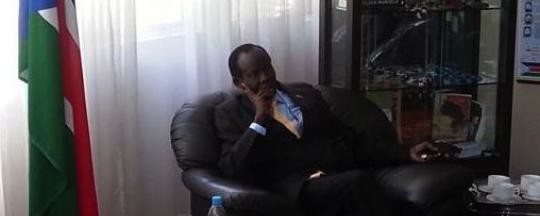James Wani Igga, South Sudan’s vice president, revealed in an interview that one of the leaders of the SPLM-G7 faction, Deng Alor, suggested that he consider contesting for the chairmanship of the ruling party.
Former cabinet minister Deng Alor, who now is part of the so-called ‘Group of Seven’ bloc of SPLM dissidents, was ousted from his position in 2013 following his alleged involvement in a financial scandal.
Before the December crisis, though at which point exactly is not clear, Alor appears to have considered backing Igga for the chairmanship of the party, presumably on the condition that he join the SPLM dissidents and challenge the sitting chairman President Salva Kiir.
In a lengthy interview with New Nation newspaper, Igga said that he was approached last year by the group of SPLM dissidents that then included ousted Vice President Riek Machar, a number of dismissed ministers and the former SPLM Secretary-General Pagan Amum.
This group of dissident leaders has now split, with Machar now leading the armed opposition, several former ministers and a former governor heading the ‘G7’ third bloc, and four other politicians including Pagan Amum still effectively under house arrest in Juba.
James Wani Igga, who took over Riek Machar’s position as vice president in July 2013, revealed that he rebuffed the offer by the ousted minister Deng Alor.
In his remarks he also expressed hostility toward his predecessor, Riek Machar, whose representatives in Addis Ababa are seeking to restore Machar to a leadership position within the government after the end of the war.
The politician explained that he discussed some party affairs last year with Pagan Amum, then the secretary-general and alleged to have been working alongside the dissident group headed by Riek Machar.
Amum at that point reportedly was at odds with the party chairman and pushing for changes in the party. Igga says that he differed with Amum: “I told him if the SPLM had failed, it was his responsibility because he was the person in charge of the party. He had been given all the political and financial powers. I asked him why he did not reorganise the SPLM and allowed the party to collapse.”
“Deng Alor then asked me to confirm if I was interested in contesting for the chairmanship. But I told him: ‘If all four of us are going to contest, we will all be losers and another dog will run away with the bone,” stated Igga.
“I made some arithmetic. I said given our inclination to vote according to regions and ethnicity, President Salva Kiir would get over 90 percent of the votes in his home region of Bahr el Ghazal. I would get over 90 percent in Equatoria. But Riek Machar and Pagan Amum both hail from the same region – Upper Nile. I told them it would be hard for them to get 50 percent each in those states because Kiir and myself would also garner votes there,” said Igga.
“Amum would further need to share the votes in his area with Lam Akol. So Machar might end up with only 16.5 percent of the votes in Upper Nile, which constitutes one third of the regions in South Sudan. I told him: ‘That cannot make you a president. If I were you, I would not even bother because what is needed according to the Constitution is 50+1 percent. It will be a wasteful exercise.’”
The scenario described by the current vice president is not one that was publically discussed at the time. Neither Amum nor Alor have confirmed that they in fact were proposing that multiple candidates contest for the position of chairman.
In further remarks, Igga hints at a rivalry with Machar dating back several years. He claims that Machar at the 2008 convention supported the idea of appointment of deputy chairpersons because he feared Igga would defeat him in a party election.
“At that time, he realised most people would have supported my candidature (for deputy chairman) rather than his, so he rejected any elections,” added Igga.
The vice president at the latest National Liberation Council meeting, which took place in the days before the crisis broke on 15 December, backed the chairman’s position that deputy chairpersons should be appointed, not elected.
File photo: Vice President James Wani Igga




